Here you will find all kinds of parts, components and accessories you will need in various projects, starting from simple wires, sensors and displays to already pre-assembled modules and kits.
Components
-
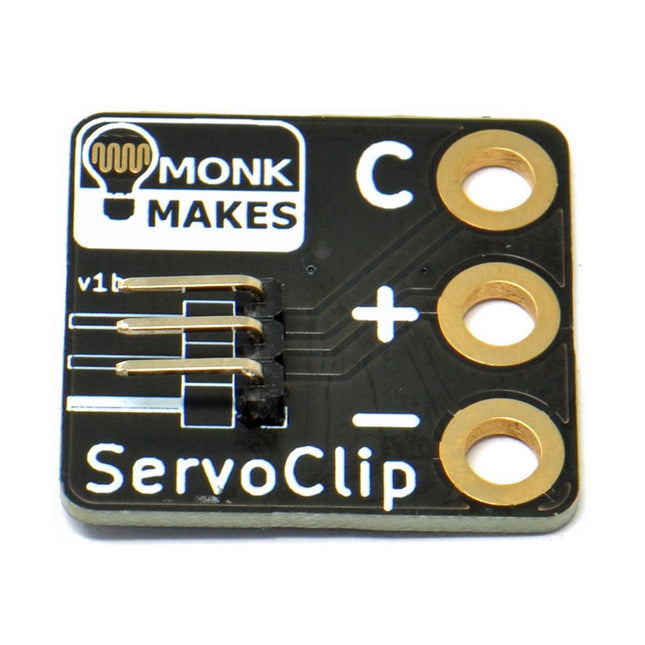
MonkMakes MonkMakes ServoClip
An adapter for connecting a servo meter with croc/alligator clips. This is a handy little clip to connect a servo motor with 5.4 mm header socket using alligator clips. It is ideal for use with boards like the BBC micro:bit and Adafruit's Circuit Playground Express or Gemma. Width: 27 mm Height: 35 mm Downloads Datasheet
€ 3,95
Members € 3,56
-
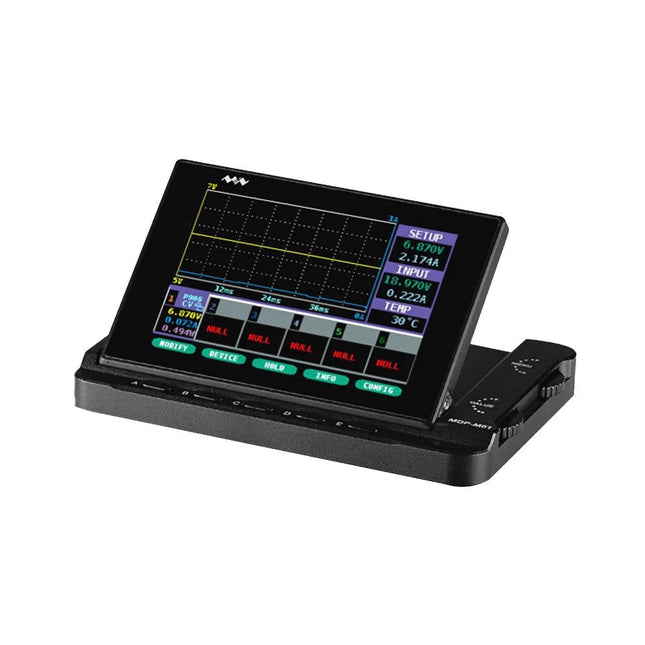
Miniware Miniware MDP-M01 Smart Digital Monitor
MDP-M01 is a display control module equipped with a 2.8-inch TFT display screen, the screen can be turned 90 degrees, which is convenient for users to view data and waveform. MDP-M01 can realize online display and control with MDP-P906 mini digital power supply modules and other modules of MDP system through 2.4 GHz wireless communication, and can control up to 6 sub-modules at the same time. Specifications Screen size 2.8" TFT Screen resolution 240 x 320 Power Micro USB power input, or taking power from sub-module via dedicated power cable Input DC 5 V/0.3 A Other functions Can control up to 6 sub-modulesUpgrade firmware through Micro USB Dimensions 107 x 66 x 13.6 mm Weight 133 g Included 1x MDP-M01 Smart Digital Monitor 1x Cable (2.5 mm jack to Micro USB) Downloads User Manual v3.4 Firmware v1.32
€ 84,95€ 42,50
Members identical
-

Arduino Arduino MKR NB 1500
Arduino MKR NB 1500 allows you to build your next smart project. Ever wanted an automated house? Or a smart garden? Well, now it’s easy with the Arduino IoT Cloud compatible boards. It means: you can connect devices, visualize data, control and share your projects from anywhere in the world. Whether you’re a beginner or a pro, we have a wide range of plans to make sure you get the features you need. Add Narrowband communication to your project with the MKR NB 1500. It's the perfect choice for devices in remote locations without an Internet connection, or in situations in which power isn't available like on-field deployments, remote metering systems, solar-powered devices, or other extreme scenarios. The board's main processor is a low power ARM Cortex-M0 32-bit SAMD21, like in the other boards within the Arduino MKR family. The Narrowband connectivity is performed with a module from u-blox, the SARA-R410M-02B, a low power chipset operating in the de different bands of the IoT LTE cellular range. On top of those, secure communication is ensured through the Microchip ECC508 crypto chip. Besides that, the pcb includes a battery charger, and a connector for an external antenna. This board is designed for global use, providing connectivity on LTE's Cat M1/NB1 bands 1, 2, 3, 4, 5, 8, 12, 13, 18, 19, 20, 25, 26, 28. Operators offering service in that part of the spectrum include: Vodafone, AT&T, T-Mobile USA, Telstra, and Verizon, among others. Specifications The Arduino MKR NB 1500 is based on the SAMD21 microcontroller. Microcontroller SAMD21 Cortex-M0+ 32-bit low power ARM MCU (datasheet) Radio module u-blox SARA-R410M-02B (datasheet summary) Secure element ATECC508 (datasheet) Board power supply (USB/VIN) 5 V Supported battery Li-Po Single Cell, 3.7 V, 1500 mAh Minimum Circuit operating voltage 3.3 V Digital I/O pins 8 PWM pins 13 (0 .. 8, 10, 12, 18 / A3, 19 / A4) UART 1 SPI 1 I²C 1 Analog input pins 7 (ADC 8/10/12 bit) Analog output pins 1 (DAC 10 bit) External interrupts 8 (0, 1, 4, 5, 6, 7, 8, 16 / A1, 17 / A2) DC current per I/O pin 7 mA Flash memory 256 KB (internal) SRAM 32 KB EEPROM No Clock speed 32.768 kHz (RTC), 48 MHz LED_BUILTIN 6 USB Full-speed USB device and embedded host Antenna gain 2 dB Carrier frequency LTE bands 1, 2, 3, 4, 5, 8, 12, 13, 18, 19, 20, 25, 26, 28 Power class (radio) LTE Cat M1 / NB1: Class 3 (23 dBm) Data rate (LTE M1 halp-duplex) UL 375 kbps / DL 300 kbps Data rate (LTE NB1 full-duplex) UL 62.5 kbps / DL 27.2 kbps Working region Multiregion Device location GNSS via modem Power consumption (LTE M1) min 100 mA / max 190 mA Power consumption (LTE NB1) min 60 mA / max 140 mA SIM card MicroSIM (not included with the board) Dimensions 67.6 x 25 mm Weight 32 g Downloads Eagle Files Schematics Pinout
€ 94,95€ 79,95
Members identical
-

Arduino Arduino MKR Zero
The Arduino MKR Zero is a development board for music makers! With an SD card holder and dedicated SPI interfaces (SPI1), you are able to play music files without extra hardware. The MKR Zero brings you the power of a Zero in the smaller format established by the MKR form factor. The MKR Zero board acts as a great educational tool for learning about 32-bit application development. It has an on-board SD connector with dedicated SPI interfaces (SPI1) that allows you to play with MUSIC files with no extra hardware! The board is powered by Atmel’s SAMD21 MCU, which features a 32-bit ARM Cortex M0+ core. The board contains everything needed to support the microcontroller; simply connect it to a computer with a micro-USB cable or power it by a LiPo battery. The battery voltage can also be monitored since a connection between the battery and the analog converter of the board exists. Specifications Microcontroller SAMD21 ARM Cortex-M0+ 32-bit low power Board power supply (USB/VIN) 5 V Supported battery Li-Po single cell, 3.7 V, 700 mAh minimum DC current for 3.3 V pin 600 mA DC current for 5 V pin 600 mA Circuit operating voltage 3.3 V Digital I/O pins 22 PWM pins 12 (0, 1, 2, 3, 4, 5, 6, 7, 8, 10, A3 - or 18 -, A4 -or 19) UART 1 SPI 1 I²C 1 Analog input pins 7 (ADC 8/10/12 bit) Analog output pins 1 (DAC 10 bit) External interrupts 10 (0, 1, 4, 5, 6, 7, 8, A1 -or 16-, A2 - or 17) DC current per I/O pin 7 mA Flash memory 256 KB Flash memory for bootloader 8 KB SRAM 32 KB EEPROM No Clock speed 32.768 kHz (RTC), 48 MHz LED_BUILTIN 32 Downloads Datasheet Eagle Files Schematics Fritzing Pinout
€ 36,95
Members € 33,26
-

Farnell element14 RF/Coaxial Cable Assembly – SMA Plug to SMA Plug (76.2 mm) MC001054
SMA Straight Plug to SMA Straight Plug, 76.2 mm Specifications Frequency range 0 to 18 GHz VSWR (≤1.35) Insertion loss ≤0,22 db Body Brass Nickel Centre contact Brass Gold Insulator PTFE
€ 14,95
Members € 13,46
-

Generic Ultrasonic Distance Sensor (ME007-ULA V1)
This ultrasonic distance sensor (ME007-ULA V1) offers high performance with a robust, waterproof probe. Operating on the principle of ultrasonic echo ranging, the sensor determines the distance to a target by measuring the time elapsed between sending a pulse and receiving the echo. Its non-contact design allows it to detect a wide range of materials, including transparent or non-ferrous objects, metals, non-metals, liquids, solids, and powders. Specifications Detecting Distance 27~800 cm Output Interface RS232, Voltage Analog Operating Voltage 5-12 V Average Current <10 mA Operating Temperature −15~60°C Dimensions 60 x 43 x 31 mm
€ 29,95
Members € 26,96
-

Velleman Whadda E-12 Series Resistor Set (610 pcs)
The Whadda E12 is a high-quality carbon film resistor set comprising 610 pieces, with 10 pieces for each of the 61 standard E12 series values ranging from 10 Ω to 1 MΩ. Each resistor has a power rating of 0.25 W, a tolerance of 5%, and can operate within a temperature range of -55°C to 155°C. The maximum operating voltage is 250 V. These resistors are suitable for applications in TVs, audio and video equipment, telephone receivers, communication systems, instrumentation, and home appliances.
€ 11,95
Members € 10,76
-

Velleman Whadda Electronic Christmas Tree
The Christmas tree with flashing LEDs takes the coziness of Christmas to a new level! With 16 flashing LEDs, this green Christmas tree creates a warm atmosphere. With very low power consumption and the option to be powered by a 9-volt battery (not included), this Christmas decoration is easy to use. Enjoy the holidays with this atmospheric addition to your decoration collection. Downloads Manual
€ 9,95
Members € 8,96
-
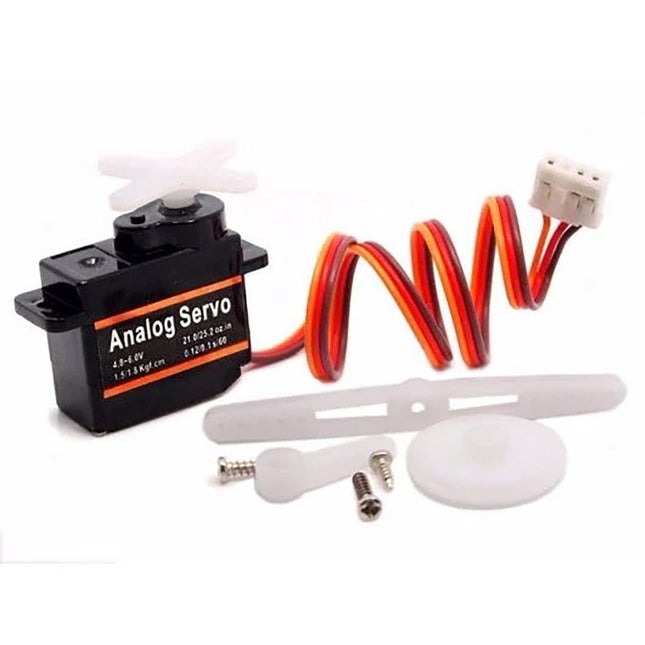
€ 10,95
Members € 9,86
-

SparkFun SparkFun Qwiic IR Array MLX90640 Breakout
The MLX90640 SparkFun IR Array Breakout features a 32×24 array of thermopile sensors generating, in essence, a low resolution thermal imaging camera. With this breakout you can observe surface temperatures from a decent distance away with an accuracy of ±1.5°C (best case). This board communicates via I²C using the Qwiic system developed by Sparkfun, which makes it easier to operate the breakout. However, there are still 0.1'-spaced pins in case you favour using a breadboard. The SparkFun Qwiic connect system is an ecosystem of I²C sensors, actuators, shields and cables that make prototyping faster and helps you avoid errors. All Qwiic-enabled boards use a common 1 mm pitch, 4-pin JST connector. This reduces the amount of required PCB space, and polarized connections help you connect everything correctly. This specific IR Array Breakout provides a 110°×75° field of view with a temperature measurement range of -40~300°C. The MLX90640 IR Array has pull up resistors attached to the I²C bus; both can be removed by cutting the traces on the corresponding jumpers on the back of the board. Please be aware that the MLX90640 requires complex calculations by the host platform so a regular Arduino Uno (or equivalent) doesn't have enough RAM or flash to complete the complex computations required to turn the raw pixel data into temperature data. You will need a microcontroller with 20,000 bytes or more of RAM.
€ 109,95€ 79,95
Members identical
-
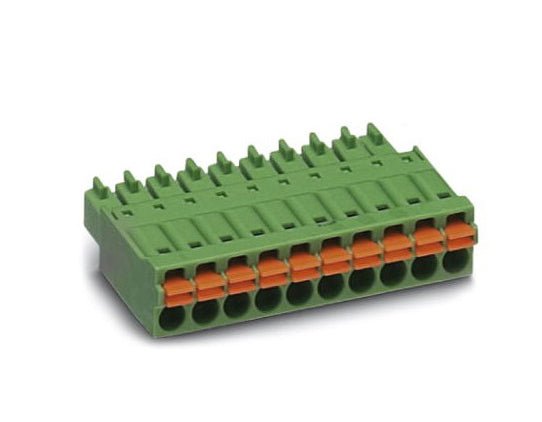
Phoenix Contact PCB Connector - 14 pos. push-in spring connection
This 14-way MonoDAQ-compatible connector allows the user to create, reuse and archive test fixtures instead of rewiring the connector furnished with the MonoDAQ everytime a measurement or test has to be repeated. Helps the user to build a library of plug-and-play test setups. Features Time saving push-in connection, tools not required Defined contact force ensures that contact remains stable over the long term Intuitive use through colour coded actuation lever Operation and conductor connection from one direction enable integration into front of device All necessary technical data can be found here.
€ 8,95
Members € 8,06
-
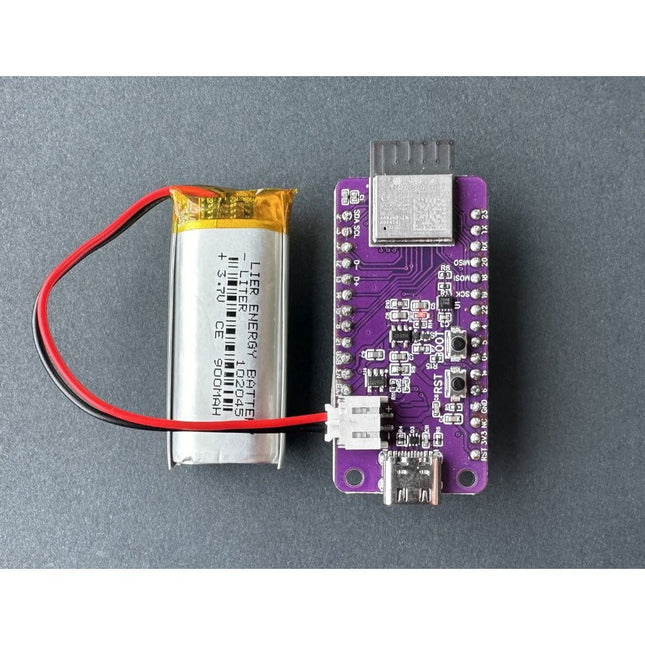
ThingPulse ThingPulse LiPo Battery for Color Kit Grande (900 mAh)
Enhance your ESP32 WiFi Color Display Kit Grande with this high-quality 900 mAh rechargeable lithium-polymer battery! Designed to provide long-lasting power, this battery ensures your projects remain portable and efficient. With its compact size and lightweight design, it’s the perfect accessory for any DIY electronics enthusiast. The battery offers reliable performance, easy integration, and safe, stable power supply, making it ideal for extended use in a variety of applications. 900 mAh LiPo battery JST Connector, fitting ePulse Feather
€ 16,95
Members € 15,26
-

Velleman Whadda Flashing LED Sweethearts
Valentine's Hearts, 28 blinking LEDs, romantic LED lighting Valentine's Hearts – 28 blinking LEDs for a romantic atmosphere. The perfect Valentine's gift to express your love. Battery-powered and portable, ideal for Valentine's Day. Downloads Manual
€ 11,95
Members € 10,76
-

Velleman Whadda Brain Game
4 LEDs and 4 push buttons ensure hours of fun. Repeat the combination, harder and harder, faster and faster. The microprocessor-controlled game has 4 different difficulty levels and low consumption. The sound and/or LED indication are adjustable. To save the three 1.5 V AA batteries (not included), the kit automatically switches itself off when not in use. Downloads Manual
€ 11,95
Members € 10,76
-

Waveshare Waveshare CoreEP4CE10 (ALTERA Core Board)
Waveshare CoreEP4CE10 is an FPGA core board that features an EP4CE10F17C8N device onboard supporting further expansion. Features Onboard Serial Configuration Device EPCS16SI8N Integrated FPGA basic circuit, such as clock circuit Onboard nCONFIG button, RESET button, 4x LEDs All the I/O ports are accessible on the pin headers Onboard JTAG debugging/programming interface 2.00 mm header pitch design, suitable for being plugged-in your application system Downloads Wiki
€ 84,95€ 59,95
Members identical
-

SparkFun SparkFun DLI Kit
Reinforcing its commitment to widening the accessibility to and innovation in the area of deep learning, NVIDIA has created a free, self-paced, online Deep Learning Institute (DLI) course, “Getting Started on AI with Jetson Nano.” The course's goal is to build foundational skills to enable anyone to get creative with the Jetson Developer Kit. Please be aware that this kit is for those who already own a Jetson Nano Developer Kit and want to join the DLI Course. A Jetson Nano is not included in this kit. Included in this kit is everything you will need to get started in the “Getting Started on AI with Jetson Nano” (except for a Jetson Nano, of course), and you will learn how to Set up your Jetson Nano and camera Collect image data for classification models Annotate image data for regression models Train a neural network on your data to create your own models Run inference on the Jetson Nano with the models you create The NVIDIA Deep Learning Institute offers hands-on training in AI and accelerated computing to solve real-world problems. Developers, data scientists, researchers, and students can get practical experience powered by GPUs in the cloud and earn a competency certificate to support professional growth. They offer self-paced, online training for individuals, instructor-led workshops for teams, and downloadable course materials for university educators. Included 32 GB microSD Card Logitech C270 Webcam Power Supply 5 V, 4 A USB Cable - microB (Reversible) 2-Pin Jumper Please note: Jetson Nano Developer Kit not included.
€ 79,95€ 39,95
Members identical
-

Waveshare Waveshare DVK600 FGPA CPLD Core Board
Waveshare DVK600 is an FPGA CPLD mother board that features expansion connectors for connecting FPGA CPLD core board and accessory boards. DVK600 provides an easy way to set up FPGA CPLD development system. Features FPGA CPLD core board connector: for easily connecting core boards which integrate an FPGA CPLD chip onboard 8I/Os_1 interface, for connecting accessory boards/modules 8I/Os_2 interface, for connecting accessory boards/modules 16I/Os_1 interface, for connecting accessory boards/modules 16I/Os_2 interface, for connecting accessory boards/modules 32I/Os_1 interface, for connecting accessory boards/modules 32I/Os_2 interface, for connecting accessory boards/modules 32I/Os_3 interface, for connecting accessory boards/modules SDRAM interface for connecting SDRAM accessory board also works as FPGA CPLD pins expansion connectors LCD interface, for connecting LCD22, LCD12864, LCD1602 ONE-WIRE interface: easily connects to ONE-WIRE devices (TO-92 package), such as temperature sensor (DS18B20), electronic registration number (DS2401), etc. 5 V DC jack Joystick: five positions Buzzer Potentiometer: for LCD22 backlight adjustment, or LCD12864, LCD1602 contrast adjustment Power switch Buzzer jumper ONE-WIRE jumper Joystick jumper Downloads Schematics
€ 22,95
Members € 20,66
-

Seeed Studio Seeed Studio Deep Learning Starter Kit for Jetson Nano
The starter kit for Jetson Nano is one of the best kits for beginners to get started with Jetson Nano. This kit includes 32 GB MicroSD card, 20 W adapter, 2-pin jumper, camera, and micro-USB cable. Features 32 GB High-performance MicroSD card 5 V 4 A power supply with 2.1 mm DC barrel connector 2-pin jumper Raspberry Pi camera module V2 Micro-B To Type-A USB cable with DATA enabled
€ 64,95€ 32,50
Members identical
-
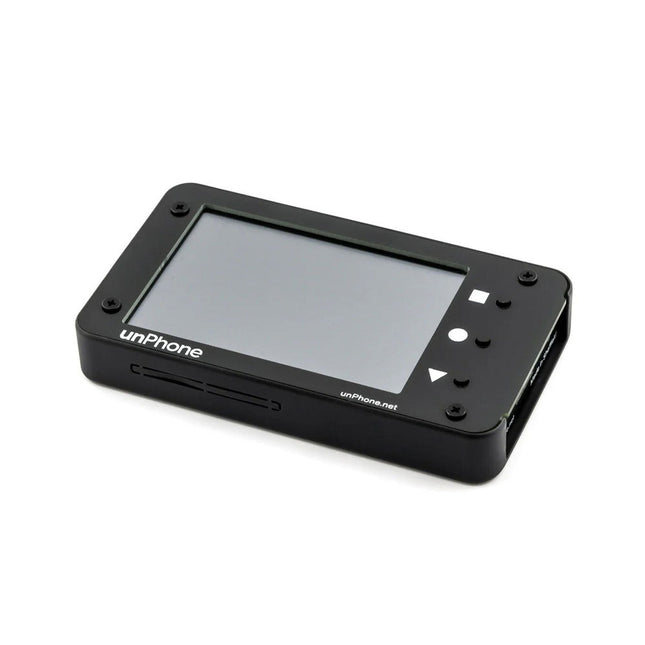
Pimoroni unPhone IoT Development Platform
The unPhone is an open-source IoT development platform powered by the ESP32S3 microcontroller. It features integrated LoRa, Wi-Fi, and Bluetooth connectivity, a touchscreen, and a LiPo battery, offering a robust and versatile solution for IoT development. Its compatibility with Adafruit's FeatherWing standard enables easy expansion, making it an ideal choice for educators, makers, and developers seeking a flexible and user-friendly platform. Features ESP32S3 microcontroller (with 8 MB flash and 8 MB PSRAM) LoRaWAN licence-free radio communication (plus the ESP32's excellent wifi and bluetooth support) 3.5" (320 x 480) LCD capacitive touchscreen for easy debugging and UI creation IR LEDs for surreptitiously switching the cafe TV off 1200 mAh LiPo battery with USB-C charging Vibration motor for notifications Compass/Accelorometer A robust case SD card slot Power and reset buttons Programmable in C++ or CircuitPython Expander board that supports two Featherwing sockets and a prototyping area Open source firmware compatible with the Arduino IDE, PlatformIO and Espressif's IDF development framework Included unPhone (assembled) Expander board FPC cable (to link the expander board to unPhone) Self adhesive mounts for the expander board Code Examples C++ library Kick the tyres on everything in the box The main LVGL demo CircuitPython Support forum Textbook (especially chapter 11)
€ 219,00€ 109,50
Members identical
-

Velleman Whadda Electronic Dice
This electronic dice with 7 red LEDs rolls when the push button is released and works with a 9 V battery (not included). Downloads Manual
€ 9,95
Members € 8,96
-

Velleman Whadda Flashing LEDs
This educational soldering kit is suitable for all kinds of applications such as model making and works with a 9 V battery (not included). You can control the flashing speed with two potentiometers. Downloads Manual
€ 8,95
Members € 8,06
-
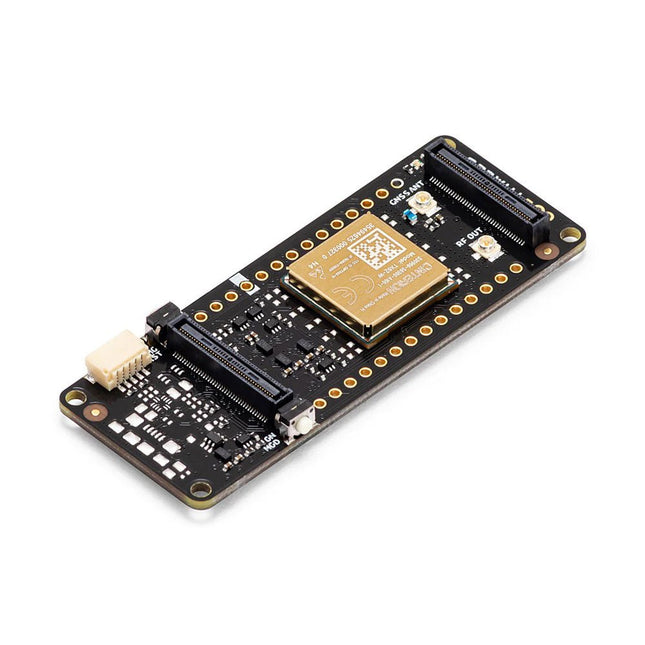
Arduino Arduino Pro Portenta Cat-M1 NB-IoT GNSS Shield
The Arduino Pro Portenta Cat. M1/NB IoT GNSS Shield allows you to enhance the connectivity features of your Portenta H7 applications. The shield leverages a Cinterion TX62 wireless module by Thales, designed for highly efficient, low-power IoT applications to deliver optimized bandwidth and performance. The Portenta Cat. M1/NB IoT GNSS Shield combines with the strong edge computing power of the Portenta H7 to enable the development of asset tracking and remote monitoring applications in industrial settings, as well as in agriculture, public utilities and smart cities. The shield offers cellular connectivity to both Cat. M1 and NB-IoT networks with the option to use eSIM technology. Easily track your valuables – across the city or worldwide – with your choice of GPS, GLONASS, Galileo or BeiDou. Features Change connectivity capabilities without changing the board Add NB-IoT, CAT. M1 and positioning to any Portenta product Possibility to create a small multiprotocol router (WiFi - BT + NB-IoT/CAT. M1) Greatly reduce communication bandwidth requirements in IoT applications Low-power module Compatible also with MKR boards Remote Monitoring Industrial and agricultural companies can leverage the Portenta Cat. M1/NB IoT GNSS Shield to remotely monitor gas detectors, optical sensors, machinery alarm systems, biological bug traps and more. Technology providers providing smart city solutions can compound the power and reliability of the Portenta H7 with the Portenta Cat. M1/NB IoT GNSS Shield, to connect data and automate actions for a truly optimized use of resources and enhanced user experience. Asset Monitoring Add monitoring capabilities to any asset by combining the performance and edge computing features of the Portenta family boards. The Portenta Cat. M1/NB IoT GNSS Shield is ideal to monitor valuable goods and also for monitoring industrial machinery and equipment. Specifications Connectivity Cinterion TX62 wireless module; NB-IoT - LTE CAT.M1; 3GPP Rel.14 Compliant Protocol LTE Cat. M1/NB1/NB2; UMTS BANDS: 1 / 2 / 3 / 4 / 5 / 8 / 12(17) / 13 / 18 / 19 / 20 / 25 / 26 / 27 / 28 / 66 / 71 / 85; LTE Cat.M1 DL: max. 300 kbps, UL: max. 1.1 Mbps; LTE Cat.NB1 DL: max. 27 kbps, UL: max. 63 kbps; LTE Cat.NB2 DL: max. 124 kbps, UL: max. 158 kbps Short messaging service (SMS) Point-to-point mobile terminated (MT) and mobile originated (MO) Text Mode; Protocol Data Unit (PDU) Mode Localization support GNSS capability (GPS/BeiDou/Galileo/GLONASS) Other Embedded IPv4 and IPv6 TCP/IP stack access; Internet Services: TCP server/client, UDP client, DNS, Ping, HTTP client, FTP client, MQTT client Secure Connection with TLS/DTLS Secure boot Dimensions 66 x 25.4 mm Operating temperature -40° C to +85° C (-104° F to 185°F) Downloads Datasheet Schematics
€ 99,95€ 74,95
Members identical





















